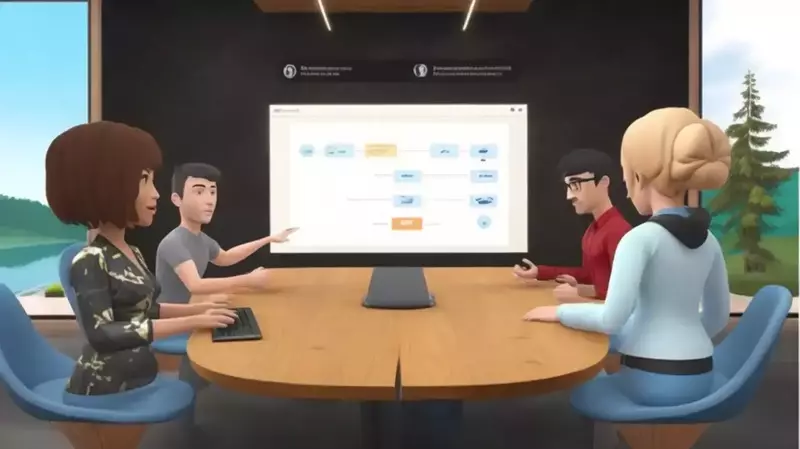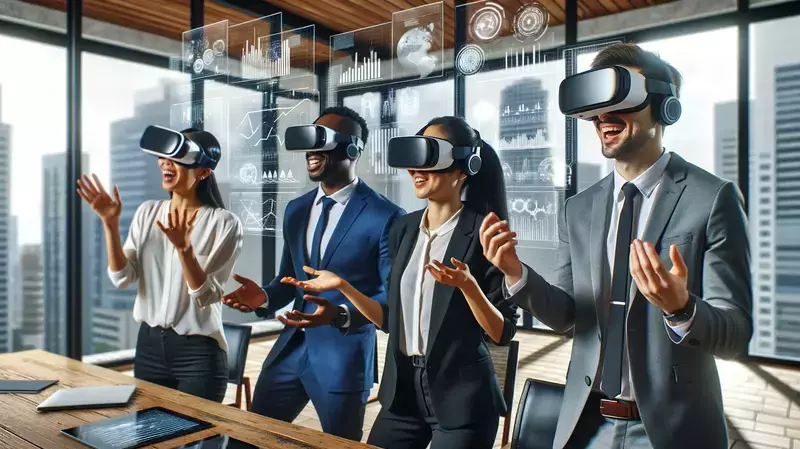This site contains affiliate links to products, and we may receive a commission for purchases made through these links.
The metaverse in business is more than a buzzword; it’s an evolving digital ecosystem where physical and virtual realities coexist.
This article seeks to elucidate the idea of a metaverse, its roots, and how Unreal Engine is an essential factor in its advancement.
This comprehensive guide seeks to provide a deep understanding of the long-term impact of incorporating Metaverse business models into your customer journey strategy using artificial intelligence tools, amongst other technologies.
Key Takeaways:
- The metaverse has the potential to revolutionize various aspects of daily life, from business operations to gaming and beyond.
- Tech giants are investing heavily in metaverse-related technologies, recognizing its transformative power across industries.
- The metaverse presents opportunities for enhanced collaboration, new revenue streams for businesses, and immersive user engagement through virtual reality experiences. However, it also poses challenges related to privacy, security, and data handling, which need to be addressed through robust cybersecurity measures and regulations.
Understanding the Metaverse
The metaverse is a fascinating concept that has been gaining momentum in recent years. This simulated world, created by video game software, could revolutionize many aspects of our daily lives.
The term was first coined in Neil Stephenson’s 1992 novel Snow Crash and has since evolved with advancements in technology.
Definition and Origin of the Metaverse
In its simplest form, the metaverse can be defined as a virtual reality space where users can interact with each other and their environment.
It’s like an internet brought to life or a universe parallel to ours but accessible via computer technologies.
Role of Unreal in Developing the Metaverse
A significant player shaping this digital landscape is Unreal Engine, developed by Epic Games. As one of the most advanced 3D rendering engines, Unreal Engine provides developers with tools for crafting complex virtual realms for gaming and beyond.
The future implications of such developments are vast – from education to business operations; everything might have a new dimension within this evolving realm known as ‘the metaverse.’
So whether you’re an avid gamer or just curious about what lies ahead on technological frontiers – stay tuned because we’re only scratching the surface.
Tech Titans’ Investment in Metaverse

As we dive deeper into the digital age, major tech companies recognize the metaverse’s potential.
These giants invest heavily in metaverse-related technologies, betting on their transformative power across various industries.
Significant Investments Made by Tech Giants
In 2023, Microsoft, a leading player in this field, invested an astounding $10 billion in these technologies.
This financial commitment underscores Microsoft’s belief that the metaverse will revolutionize gaming and sectors like education and healthcare.
Potential Benefits for Businesses
- Enhanced Collaboration: The metaverse can facilitate seamless collaboration between teams located anywhere globally, making remote work more efficient.
- New Revenue Streams: Businesses can create unique virtual experiences or products within the metaverse to generate additional income.
- User Engagement: Companies can engage with customers on a whole new level through immersive experiences offered by virtual reality (VR).
The entrance of big names into the VR realm indicates that it is viewed as a potential mainstay in our lives and could bring considerable rewards to those who venture in early. Investing early in VR technology could provide significant returns for those who do so.
To stay ahead of the curve and understand how your business could benefit from embracing VR technology, check out resources like VR Focus.
Roblox – A Platform for Virtual Experiences
If you’re a gamer or explorer of virtual worlds, you’ve probably heard of Roblox. Roblox is not only a game but also an interactive platform that allows users to craft and share their own virtual adventures.
Overview of Roblox
Established in 2004, Roblox has since become a highly acclaimed platform for user-generated content. It offers a vast array of games and experiences created by its community members using the proprietary Roblox Studio software.
The appeal of Roblox lies not only in its variety but also in its availability – users with no programming background can become creators on the platform.
Opportunities provided by Roblox
Beyond entertainment, there’s another dimension to this virtual world: entrepreneurship.
Savvy creators have found ways to monetize their creations through microtransactions within their games or experiences, opening up financial opportunities globally.
- Earning potential: Top developers earn as much as $2 million annually from sales within their games.
- User engagement: Unique virtual experiences enhance user engagement and encourage players to return regularly.
- Cross-platform play: With support for PC, mobile devices, Xbox One consoles, and VR headsets like Oculus Rift, players can access your creations anytime, anywhere.
- SEO Keywords: Looking to learn more about Roblox? Visit Roblox’s homepage for additional info.
The Metaverse & Climate Change Responses
Thanks to advanced technologies, we can tackle climate change in revolutionary ways. Take Lockheed Martin’s Cognitive Mission Manager, for example.
It uses NVIDIA’s Omniverse platform to map wildfires in 3D and predict firefront behavior using AI.
Real-time tracking and monitoring of wildfires
This innovative approach provides invaluable data to firefighters on the ground, enabling swift responses to these devastating natural disasters.
By creating an accurate digital representation or ‘twin’ of the physical world within the metaverse, we can combat climate change more effectively.
The Role of digital twins in climate change responses
Lockheed Martin’s Cognitive Mission Manager, powered by NVIDIA’s Omniverse platform, operates like an operating system for the metaverse.
It creates virtual replicas of physical entities which can then be manipulated and studied without any risk or harm to their real-world counterparts.
By utilizing virtual replicas of physical entities, we can gain a deeper insight into climate change and its effects to better prepare for any potential disasters.
Integrating metaverses into our strategies against climate change could significantly enhance our ability to respond swiftly and efficiently when disaster strikes.
Missing Links in the Metaverse
The metaverse is a vast and varied landscape of virtual worlds, but there’s one significant hurdle that prevents these different realms from truly connecting: the lack of agreed standards.
Without a common set of rules or protocols, multiple virtual worlds cannot interact seamlessly with each other.
The Need for Standard Protocols
Just like how HTML allows various websites across the globe to display information in a standardized format, we need something similar for the metaverse.
Standard protocols would enable effective collaboration between animators working with different tools across studios worldwide and allow users to traverse different digital spaces freely.
Challenges Due to Lack of Universal Scene Description (USD)
This missing link not only hampers effective collaboration but also limits users’ ability to explore endless possibilities without being confined by technical limitations.
For instance, without an equivalent “Universal Scene Description” (USD) – Pixar’s open-source framework for exchanging 3D graphics data – transferring assets and characters between separate universes can be cumbersome and inefficient.
To truly unlock the potential of the metaverse, this issue needs urgent attention. Standard protocols and a universal scene description would allow developers around the world to create more cohesive experiences and enable users to explore endless possibilities.
Let’s bridge the gap and make the metaverse a more connected and accessible place.
Mixed Reality Devices Transforming Industries
Extended or mixed reality devices are transforming several sectors, including military and healthcare.
For instance, augmented reality helps perform spinal surgeries at Johns Hopkins University in America with consistent accuracy.
Microsoft’s Partnership With the US Military on AR Technology
In a groundbreaking move, Microsoft has partnered with the U.S. military to develop augmented reality (AR) systems for soldiers.
The tech giant’s HoloLens technology is being adapted into an Integrated Visual Augmentation System (IVAS) that will provide troops with better situational awareness during missions.
Augmented Reality Assisting Medical Procedures
The medical field is also benefiting from these advancements in AR technology. Surgeons at Johns Hopkins University have been using it to improve precision during complex procedures like spinal surgeries.
By overlaying 3D models of patients’ anatomy onto their bodies, doctors can see exactly where they need to operate – reducing risks and improving patient outcomes.
This transformation isn’t limited to just these industries; education, retail, and entertainment are all experiencing paradigm shifts thanks to mixed reality technologies. Who knows what other transformative applications we’ll discover as we continue exploring this digital frontier?
Challenges and Pitfalls Associated With Metaverse
The metaverse offers infinite possibilities for business growth and development, but it also presents a series of challenges and pitfalls.
These range from issues related to privacy and security to data handling, among others.
Potential Risks Associated with the Use of Metaverse
In an increasingly digital world, privacy concerns are paramount. The metaverse is no exception. As users interact in these virtual worlds, they generate vast amounts of personal data that could be exploited if not properly secured.
The potential for cyberattacks poses a grave danger, with the capacity to cause havoc both in virtual worlds and in any real-world applications connected to them.
Hackers could potentially disrupt or manipulate virtual environments, causing significant harm both within the metaverse itself and in real-world applications linked to it.
Ways to Mitigate These Challenges
To mitigate these risks, companies must prioritize implementing robust cybersecurity measures when developing their presence in the metaverse. This includes employing advanced encryption techniques and regularly updating security protocols.
Regulations governing conduct within the metaverse are another important aspect to consider. Just like our physical society has laws protecting individuals’ rights and ensuring fair play, similar rules need to be established for this new digital frontier.
Educating users about potential risks associated with their activities in the metaverse can further help safeguard against threats while promoting the responsible use of this exciting technology.
FAQs in Relation to Metaverse in Business
How does the metaverse relate to business?
The metaverse offers businesses a new digital frontier for innovative marketing, virtual storefronts, and immersive customer experiences.
How can businesses benefit from the metaverse?
By leveraging the metaverse, businesses can gain brand exposure, launch products in an interactive environment, and reach a global audience without geographical limitations. It also opens up possibilities for remote workspaces.
How will the metaverse change the world of business?
The metaverse is set to revolutionize businesses by transforming how they interact with customers and conduct operations, from creating virtual offices to conducting real-time collaboration across borders, bringing significant changes in commerce and finance.
What businesses can we do in the metaverse?
Businesses can venture into digital real estate trading, offer VR-based services like fitness classes or concerts, and even create unique NFTs within their own branded spaces inside the metaverse. VentureBeat has more on this.
Final Thoughts
New information not included in the outline can add depth and interest to your blog post.
Personal opinions or experiences can help to connect with your readers and make your writing more relatable.
- Using strong SEO keywords can help improve your search engine rankings.
- Adding links to credible sources can provide additional information and support your claims.
- Short, witty sentences can keep your readers engaged and entertained.
- Writing in an active voice can make your writing more dynamic and engaging.
- Using HTML tags like strong and b can help emphasize important points in your writing.
- Remember to proofread your writing for spelling and grammar errors.
Overall, writing a successful blog post requires a combination of creativity, research, and attention to detail.

Espen
Espen is the Director of PursuitMeta and has written extensively about Virtual Reality and VR Headsets for years. He is a consumer product expert and has personally tested VR Headsets for the last decade.





Leave a Reply